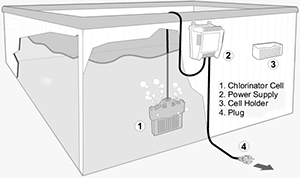Saltwater Hot Tub - Pros & Cons
If you have been busy lately, you may have missed the new craze in hot tub maintenance - saltwater spa systems.

A saltwater hot tub uses a salt cell, which reacts with the salt that you add to the water (2 lbs. per 100 gallons), to produce pure chlorine. A low voltage power supply is mounted on the spa, where you can increase or decrease the chlorine level and set an operation timer.
Salt systems have many fans who say it's very easy to use, and they don't have to touch or store bromine or chlorine. Most people also love the way the water has a softer and silkier feel. However, saltwater hot tubs have a few detractors. Let's look at the pros and cons of switching from tablets to salt to sanitize the water.
Saltwater Hot Tub - Pros
- Softer & Silkier Water: You'll notice right away that saltwater feels softer, almost like a mineral bath. The salt used is sodium chloride, which is essentially regular table salt. It's also the same salt that is in the ocean, but only about a tenth of the amount. Get a 40 lb. bag of pool salt, add 2 lbs. per 100 gallons of spa water, and you're ready to go! The salt is very cheap, about $7 per bag. The slightly salty spa water leaves your skin feeling refreshed, not irritated, like bathing in mineral spring water.
- No More Sanitizer: Maybe the best benefit of a saltwater hot tub is that you no longer need to store bromine or chlorine tablets. You should still shock the spa, so keep a granular oxidizer on hand, but you can use chlorine-free MPS if you prefer. Spa salt systems make their own chlorine, so it's still a chlorinated spa. However, the chlorine is created naturally, without binders or additives. It's pure chlorine.
- No More Odor: Chlorine tablets smell bad in the bucket and bad in the spa. Bromine is a little bit better, but I can still smell it on my skin and on my hair hours after soaking. Have you ever opened up your spa cover and detected the strong smell of chlorine? That's the smell of combined molecules, either chloramines or bromamines. Salt systems are much less likely to produce these foul smelling mutations of chlorine, because after a chlorine molecule is used up, it reverts back to salt, a.k.a. sodium chloride!
- Buffered Water: Adding enough salt to reach 2,000-3,000 ppm in your spa takes about 2 lbs. per 100 gallons of water. The mineral in the water raises the buffering capacity of the water to resist changes in pH, alkalinity and calcium hardness levels. The addition of salt increases the total dissolved solids of the water, making the water less aggressive and more resistant to water balance fluctuations.
Saltwater Hot Tub - Cons
- Saltwater Corrosion: The main issue against saltwater hot tubs is that salt causes corrosion. At levels of 2,000-3,000 ppm, there should be no worry about damage to finishes and pool equipment. There is one material in particular that doesn't like salt, that being Buna rubber, which some pump shaft seals are made of. Again, at normal levels, there should be no concern. But if your pump seal begins to leak, we do have pump shaft seal made for high salt or ozone conditions.
- Salt Cell Replacement: The salt cell used for saltwater hot tubs is a titanium coated electrolytic cell, which will eventually lose enough of its coating to stop producing enough chlorine. Spa salt cells usually last 2-5 years, depending on the model. At that point, you can replace just the cell (not the power supply). Keeping your cell clean (some models are self-cleaning), and not using it for cold spa water (below 60° F), are key to a long cell life.
- Warm Water Only: Salt systems, for pools or spas, have trouble producing chlorine at low water temperatures. When water temperatures drop into the 60s, very little chlorine output is generated, even though your salt cell is working overtime. Many salt systems will shut down, in a self-protection mode, when low water temps are sensed. This of course, is not a big deal for spas and hot tubs, so long as you keep the water 65° F or higher. Do this, and you'll have no problems.
- Bromine is Better: Bromine does have certain qualities that make it better than chlorine, as discussed in a recent blog, Bromine vs. Chlorine in hot tubs. He points out that bromine is more stable at higher temperatures and pH levels. But most of the argument is made against tablet chlorine, not chlorine generated from salt. Although generated chlorine is still chlorine, it has fewer downsides than using tablet or granular chlorine.
Saltwater hot tubs are still using chlorine, but it's not your father's chlorine! It's pure chlorine, or hypochlorous acid, and it can't be compared to the tablet type. I love the salt system in my spa. I've had it installed for nearly a year now, and other than add some replacement salt, I haven't had to touch it. I still test the water and shock the spa weekly. But my water balance is more steady, and the water feels and smells great! The best part? There's no corrosion damage!